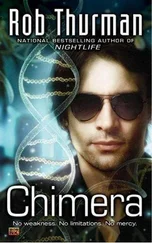Ken Goddard - Chimera
Здесь есть возможность читать онлайн «Ken Goddard - Chimera» весь текст электронной книги совершенно бесплатно (целиком полную версию без сокращений). В некоторых случаях можно слушать аудио, скачать через торрент в формате fb2 и присутствует краткое содержание. Жанр: Триллер, на английском языке. Описание произведения, (предисловие) а так же отзывы посетителей доступны на портале библиотеки ЛибКат.
- Название:Chimera
- Автор:
- Жанр:
- Год:неизвестен
- ISBN:нет данных
- Рейтинг книги:5 / 5. Голосов: 1
-
Избранное:Добавить в избранное
- Отзывы:
-
Ваша оценка:
- 100
- 1
- 2
- 3
- 4
- 5
Chimera: краткое содержание, описание и аннотация
Предлагаем к чтению аннотацию, описание, краткое содержание или предисловие (зависит от того, что написал сам автор книги «Chimera»). Если вы не нашли необходимую информацию о книге — напишите в комментариях, мы постараемся отыскать её.
Chimera — читать онлайн бесплатно полную книгу (весь текст) целиком
Ниже представлен текст книги, разбитый по страницам. Система сохранения места последней прочитанной страницы, позволяет с удобством читать онлайн бесплатно книгу «Chimera», без необходимости каждый раз заново искать на чём Вы остановились. Поставьте закладку, и сможете в любой момент перейти на страницу, на которой закончили чтение.
Интервал:
Закладка:
“Would you like some coffee, doctor? And perhaps a sweet roll?”
Draganov glanced down at the menu in his hand and then tossed it aside with a grimace. “No, it’s much too expensive here — ”
“Nonsense. I’m sure you haven’t eaten anything all morning. It will be my treat.” The newcomer looked up at the waiter. “We’ll have coffee, fruit, and breakfast pastries, please.”
Draganov waited until the waiter disappeared and then leaned across the table toward the newcomer, looking scared.
“That was you who woke me up this morning… the voice on my cell phone?”
The newcomer nodded with a slight smile.
“Then I must know… who are you… why are you here… and why were you following me this morning?” Draganov demanded in a nervous whisper, looking around to see anyone at the surrounding tables was paying any attention to their conversation. No-one seemed to be.
“My name is Emerson. Marcus Emerson,” the newcomer — whose last name was actually Wallis — lied. “And I was at your hotel this morning to make sure you made it to your lecture. I didn’t want to miss it.”
Draganov blinked. “You were there, in the audience?”
“Yes, I was. Why, do you find that surprising?”
“No, not at all,” Draganov stammered quickly, “I mean, you just don’t… seem like a man who… uh… who would be interested in my work.”
“On the contrary, doctor, I find your work to be most fascinating.”
Draganov gulped nervously. “May I ask why?”
Wallis paused while the waiter set the coffee and food on the table, and then smiled as he observed Draganov staring hungrily at the platters filled with fruit and sweet rolls.
“Help yourself, doctor. You’ve had a busy morning. Time for you to relax, enjoy your breakfast, and allow me to do the talking.”
Wallis then sipped casually at his coffee as he watched Draganov fill a plate with fruit and rolls, and begin to eat hungrily. Then, a few moments later, he set his cup down and stared quietly at the Russian scientist until Draganov finally sensed the scrutiny and looked up.
“So tell me, doctor, given the huge potential of your research, and the amount of money your anonymous benefactor initially invested in your facilities, why are you having trouble getting funding?”
Draganov blinked.
“What do you know about my bro — my, uh, b-benefactor?” he stammered.
“Not a great deal.” Wallis shrugged. “Our paths happened to cross on a remote Southeast Asian island several months ago. At some point, you and your research became a topic of conversation.”
“My brother… talked to you — a complete stranger — about my research?” Draganov looked stunned.
Wallis smiled. “Glasses of expensive vodka and remote locations have a way of rapidly creating close friendships.”
“But — do you know where he is now? I haven’t heard from him in… many months.”
“Which is presumably why you’re making a desperate pitch to the investment crowd? Your brother’s money is about to run out?”
Draganov stared at Wallis, seemingly unable to speak.
“I must say I’m not surprised,” Wallis said calmly. “Your brother was clearly a man who took substantial risks in his ‘business endeavors’; risks not necessarily appreciated by the local law enforcement agencies, much less his competitors. I have every reason to think that he was in the process of quickly relocating his operation to a more friendly work environment when we happened to meet.”
Wallis stared directly into Draganov’s horrified eyes for a long moment. “For your sake, and his, I sincerely hope he made it, Dr. Draganov. But I would assume from your lack of communication with him over these past months that he probably… didn’t.”
An ashen-faced Draganov seemed to sink deeper into his chair.
“So is that the problem you’re having with the money crowd? They think you’re too much like your brother? Too willing to gamble against the odds?”
Draganov finally seemed to find his voice.
“The investors do think my approach involves too much risk,” he acknowledged in a raspy soft voice. “They want me to make progress in smaller steps… use a more defined and less variable virus as a transport vehicle… things like that.”
I understand they’re also concerned about your use of something you call ‘transition’ genetics?”
“Yes, that too,” Draganov conceded uneasily.
“Please explain.”
Draganov hesitated, and then began to speak, staring out at the far wall. “Genetic manipulation is traditionally done by altering genetic coding — genes, if you will — in a fertilized or unfertilized egg using precisely constructed segments of DNA. This is relatively easy to do, because you are only working with a single nucleus… the drawback being the length of time it takes for the altered egg to reach adulthood.”
“Yes, I understood that from your lecture.” Wallis nodded. “Go on.”
“Transitional genetics — the protocol I’m using — involves manipulation of that same genetic coding, but in a very young animal that is still in its primary growth stage. The advantage is the relatively short time it takes for the animal to reach adulthood whereupon it can be utilized.
“And the drawback?”
“The huge number of nuclei that must be altered — essentially the entire animal, which means billions of cells at the very least. The transition must be accomplished in a rapid, thorough and precise manner, which is why I use the cold virus and nano-tube technology to replicate and insert the altered DNA segments. That particular virus type is quite effective in its infection process.”
“So are your critics right? Is the procedure too risky?”
Draganov shook his head firmly, finally meeting Wallis’ cold gaze. “No, not at all. There’s been no evidence at all in any of the literature that nano-tube technology is dangerous. They are correct in saying the cold virus can evolve — which is to say, mutate — quite quickly under certain circumstances; but virus mechanisms are well understood. It’s simply a matter of taking all of the proper precautions. There are risks of uncontrolled growth, of course; but the relevant question should be: are the risk acceptable? I — ”
“I understand the concept of risk versus reward, doctor,” Wallis said calmly. “I want to know if the projects you described in your talk are doable.”
“In what respect?”
Wallis took a small notebook out of his coat pocket, wrote down a few words, and then showed the page to Draganov.
“A feline?”
“Actually, relatively rare feline.”
“Rarity doesn’t matter if I can get access to the young animals.”
“How difficult would that be?”
“More expensive than difficult — ”
Wallis wrote down a figure and silently showed it to Draganov. “Would an investment of this nature cover all of the necessary expenses?”
Draganov’s eyes widened. “Oh my god, yes, but — ”
“The funding would be in cash. Is that a problem?”
“You mean cash deposited into our bank account?”
“No, handed to you — packets of US hundred dollar bills. No banks. No government involvement whatsoever; a concept that your brother and I happen to agree on.”
“I suppose that would be okay.” Draganov nodded hesitantly.
“Understand, doctor, I view the feline project as a test of your work. What if I also wanted this?” Wallis wrote down one more word and showed it to Draganov.
“Are you serious?”
“Yes, I am. Is it doable?”
“Yes, of course it is… but it would be much more difficult. My god, the magnitude alone — ”
“Would require a much larger investment, of course. I was thinking of adding another zero to the proposed funding.”
Читать дальшеИнтервал:
Закладка:
Похожие книги на «Chimera»
Представляем Вашему вниманию похожие книги на «Chimera» списком для выбора. Мы отобрали схожую по названию и смыслу литературу в надежде предоставить читателям больше вариантов отыскать новые, интересные, ещё непрочитанные произведения.
Обсуждение, отзывы о книге «Chimera» и просто собственные мнения читателей. Оставьте ваши комментарии, напишите, что Вы думаете о произведении, его смысле или главных героях. Укажите что конкретно понравилось, а что нет, и почему Вы так считаете.












